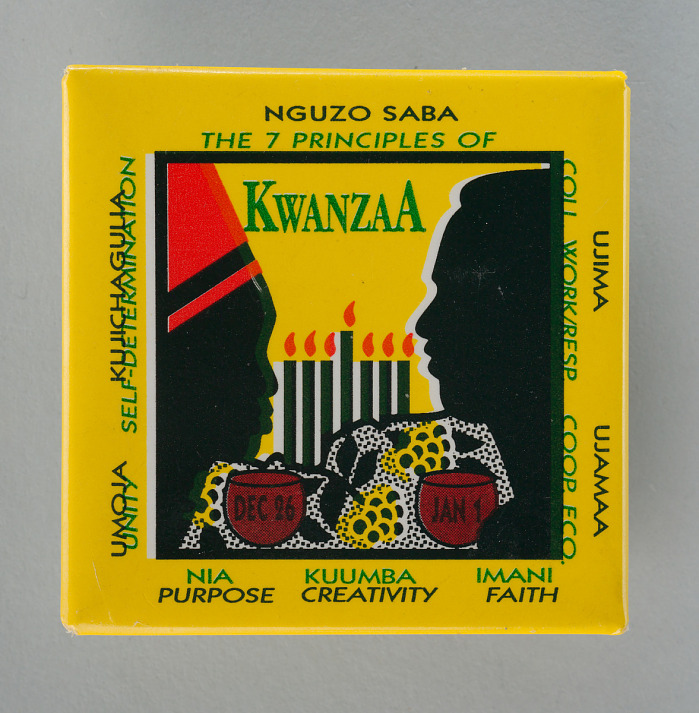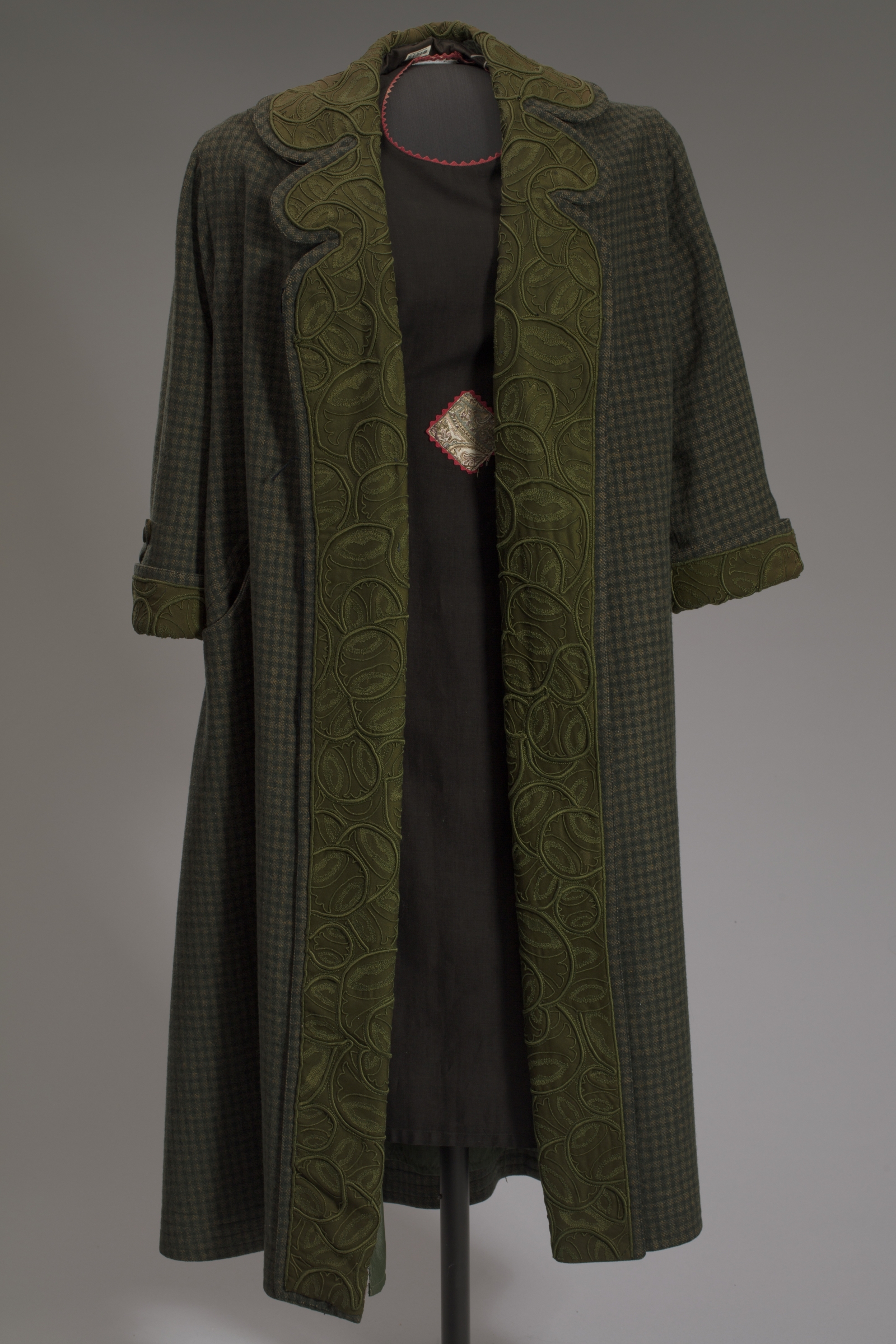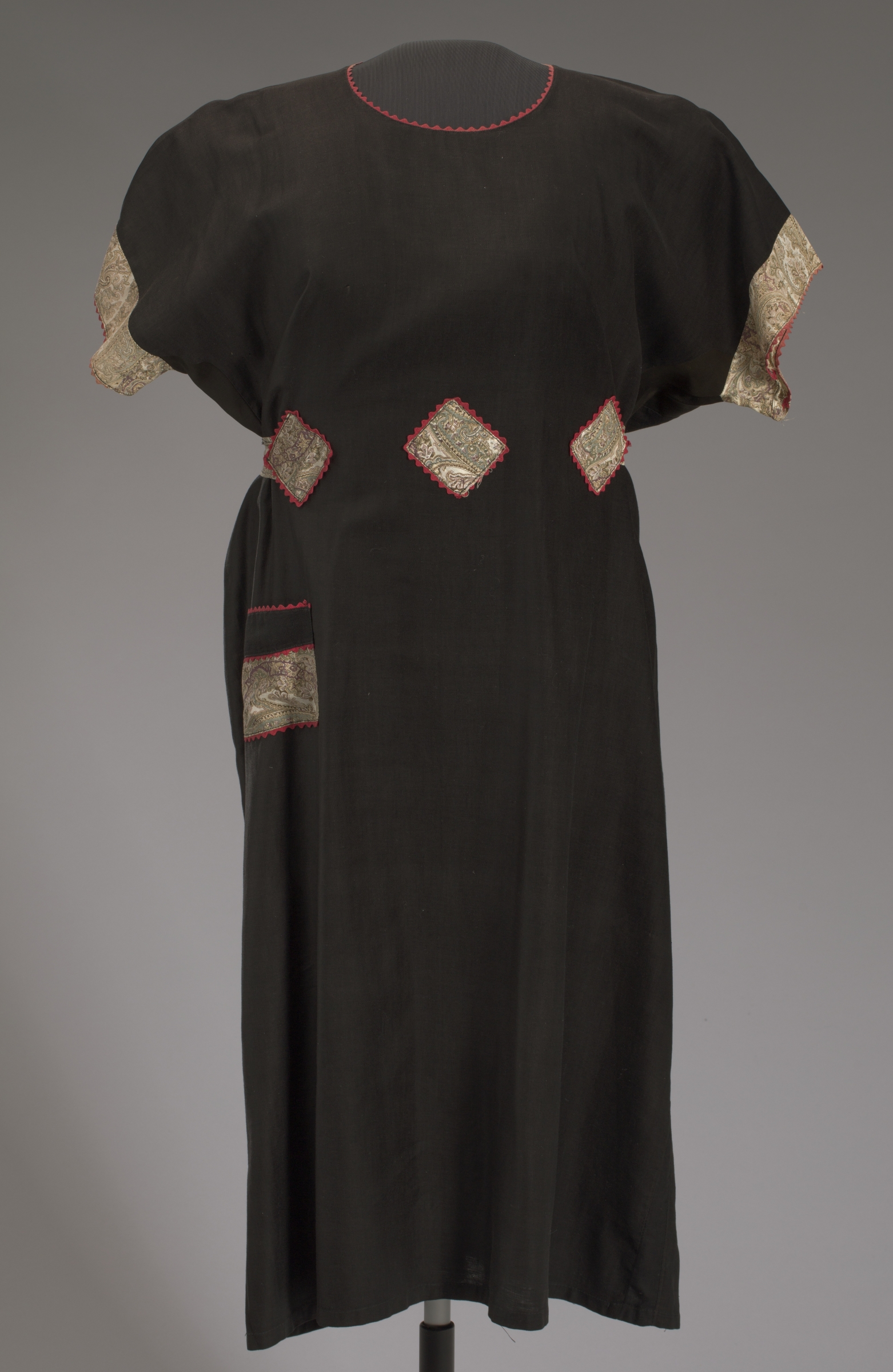Kwanzaa and Holiday Specials Highlight December Programming at the National Museum of African American History and Culture

Pinback button celebrating the seven principles of Kwanzaa.
Credit: Collection of the Smithsonian’s National Museum of African American History and Culture
The Smithsonian’s National Museum of African American History and Culture (NMAAHC) celebrates Kwanzaa throughout December. From Dec. 26 through Jan. 1, 2024, NMAAHC will feature its first- Kwanzaa display in Heritage Hall, including a kinara, mkeka mat, and a Kwanzaa playlist.
Created in 1966 by Maulana Ron Karenga, Kwanzaa is an African American and Pan-African holiday that celebrates history, values, family, community and culture. An annual celebration beginning the day after Christmas, Dec. 26 and continuing through Jan. 1, Kwanzaa emphasizes seven principles, written in the language of Swahili: Umoja (Unity), Kujichagulia (Self-Determination), Ujima (Collective Work and Responsibility), Ujamaa (Cooperative Economics), Nia (Purpose), Kuumba (Creativity), and Imani (Faith). Kwanzaa gets its name from the Swahili phrase, “matunda ya kwanza” and is rooted in first fruit celebrations found in cultures throughout Africa in both ancient and modern times. Virtual visitors can check the museum’s website for more information about Kwanzaa, including history and traditions, recipes and a reading list.
Dec. 16 marks the 20th anniversary of signing the federal legislation that created NMAAHC. The museum is commemorating this milestone by posting an interactive web feature from Dec. 15 through Dec. 25 online at nmaahc.si.edu that documents 20 key facts about the development of the museum. Through film, still photos and computer-generated graphics, the page will exhibit how the building was constructed, how collections were built, what exhibitions were created and much more.
On Dec. 30, guests can attend “Kwanzaa & Watch Night: Visions of Freedom,” a celebration of both Kwanzaa and Watch Night, a tradition that started on Dec. 31, 1862, when free and enslaved African Americans gathered, many in secret, to ring in the new year and await news that the Emancipation Proclamation would take effect on Jan. 1, 1863.
Additional December programming includes a panel discussion of the documentary Stamped From the Beginning, based on Dr. Ibram X. Kendi’s New York Times bestseller, and a screening and panel discussion of American Fiction, written and directed by Cord Jefferson and based on the 2001 novel Erasure by Percival Everett.
From Dec. 22 to Jan. 4, 2024, the Sweet Home Café presents Executive Chef Ramin Coles’ holiday menu, which includes beef pot roast, herb roasted Cornish hen, smoked ham hock succotash, scalloped potatoes, spoon bread, and more. Visit the museum’s website for details.
The museum also continues the Dine & Shop Pass program in December. Visitors can reserve a Dine and Shop Pass for specified entry to the Sweet Home Café or to shop in the museum store, from 11 a.m. – 2:30 p.m. Visitors can reserve up to four Dine & Shop passes per day and can reserve up to seven days in advance. In observation of Christmas, the museum is closed on December 25.
December Programming Highlights
Through the African American Lens: Stamped From the Beginning
Friday, Dec. 1, 7 p.m. ET
Oprah Winfrey Theater
Oscar-winning director Roger Ross Williams brings Dr. Ibram X. Kendi’s New York Times bestseller to the screen with Stamped From the Beginning. Published in 2016, Dr. Kendi’s National Book Award-winner chronicles the story of anti-Black racist ideas and their staggering power over the course of American history. Williams’ documentary adaptation uses an innovative animation process that blends live action with the art of the era to illuminate figures and moments both well-known and obscure, both historical and contemporary. Leading female academics and activists such as Dr. Angela Davis, Honorée Fanonne Jeffers, Brittany Packnett Cunningham, Dr. Jennifer L. Morgan, and Dr. Kendi guide viewers through a searing account of how racist tropes and imagery were developed and enshrined in American culture. A panel discussion featuring Dr. Kendi, Williams, Mara Brock Akil, and others will follow the screening. The panel discussion will be livestreamed. The event is free; however, registration is required.
Through the African American Lens: American Fiction
Friday, Dec. 8, 7 p.m. ET
Oprah Winfrey Theater
Join us for a screening of American Fiction, written and directed by Cord Jefferson and based on the 2001 novel Erasure by Percival Everett. Jeffrey Wright stars as Monk, a frustrated novelist who is tired of the establishment profiting from “Black” entertainment that relies on tired and offensive tropes. To prove his point, Monk uses a pen name to write a satirical “Black” book of his own, which propels him to the heart of hypocrisy and the madness he claims to disdain. A panel discussion following the screening will be livestreamed. The event is free; however, registration is required.
Kwanzaa & Watch Night: Visions of Freedom
Saturday, Dec. 30, 11 a.m. – 3 p.m. ET
Explore More! Gallery, L2; History Galleries, Concourse
Kwanzaa is a celebration created to provide a cultural grounding in and a reaffirmation of African American culture. During this event, participate in activities that honor the last three principles of Kwanzaa – Kuumba (creativity), Imani (faith) and Nia (purpose). The museum will also have special activities that focus on the history of Watch Night, and visitors can learn more about the role of the Black Colored Troops in the Civil War. The event is free; however, registration is required.
On View at the Museum
Green coat worn by Oprah Winfrey as Sofia in The Color Purple
On view in the “Taking the Stage” exhibition
The full-length, long-sleeved, single-breasted coat is made from a dark green wool tweed plaid. The coat closes at the front with five large round olive fabric-covered buttons that fasten using loops of black cord sewn to the edge of the proper right front.

Credit: Collection of the Smithsonian National Museum of African American History and Culture
Black dress worn by Oprah Winfrey as Sofia in The Color Purple
On view in the “Taking the Stage” exhibition
The short-sleeved shift dress is made from a single piece of black rayon-cotton blend satin that is folded in half at the shoulder and seamed down each side, with a neck hole cut at the fold.

Credit: Collection of the Smithsonian National Museum of African American History and Culture
About the National Museum of African American History and Culture
Since opening Sept. 24, 2016, the National Museum of African American History and Culture has welcomed more than 10 million visitors. Occupying a prominent location next to the Washington Monument on the National Mall in Washington, D.C., the nearly 400,000-square-foot museum is the nation’s largest and most comprehensive cultural destination devoted exclusively to exploring, documenting and showcasing the African American story and its impact on American and world history. For more information about the museum, visit nmaahc.si.edu or follow @NMAAHC on Twitter, Facebook and Instagram.
# # #
SI-353-2023
